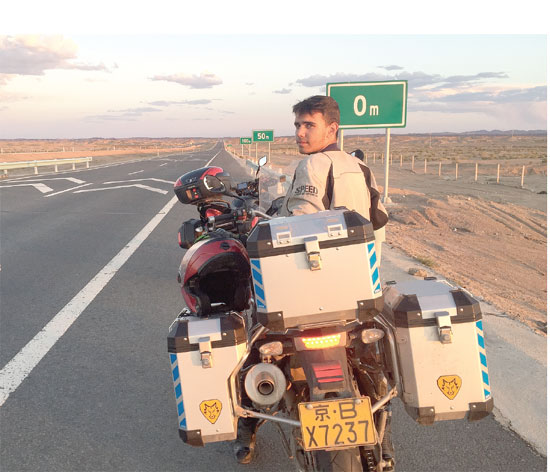|

Zach Naimon on a highway near the Xinjiang border. Photo provided to China Daily
|
Near the peak of summer in mid July, Zach Naimon, 19, was riding his motorcycle on the highway from Akzu to Kashgarin in the Xinjiang Uyghur autonomous region. Before him, a newly completed highway stretched 430 kilometers into the desert. Beneath him was a fuel tank that was full, enough to take him 300 km.
After passing two service stations he started thinking about having to refuel, but the next two service stations on the just completed highway were yet to open, and his fuel gauge told him he had enough for only about another 80 km, with the next service station just within reach, 70 km away.
Just as he arrived at the service station, the motorcycle sputtered to a halt, but that station was closed, too. The driver of a truck that happened to be pulling up told him he would have to walk 3 km down the highway to the next village, where he could refuel.
Pushing his motorcycle weighing 200 kilograms in the hot desert for four hours, Naimon had finished all his water and was hungry and exhausted when he finally reached the village at 4 pm.
Relieved that he had managed to have his tank refilled, the service station workers asked him whether he was hungry and offered him something to eat.
It was a village with a population of about 400. The news that a young American riding a motorcycle and speaking good Mandarin came to dine at the village's only restaurant next door to the service station spread through the village. Naimon's mother is from Afghanistan and his father is from Israel, and he says he felt his physical looks played a role in drawing the villagers to him.


























 Raymond Zhou:
Raymond Zhou: Pauline D Loh:
Pauline D Loh: Hot Pot
Hot Pot Eco China
Eco China China Dream
China Dream China Face
China Face






